- Home
- Julie Smith
Louisiana Hotshot Page 19
Louisiana Hotshot Read online
Page 19
“Who shot him?”
“That’s the question. My mother hated him enough— that’s for sure.”
“What’s your memory?”
“Just the shot. The body on the floor; some furniture. Funny thing, though— my brother said it happened when I was two, but going by the date on the death certificate, I was seven. He also said my father died of an overdose.”
“Weird. Was there anyone else in the room?”
“Arrrgh. I don’t know if I want to go there.”
“Uh-oh. I don’t blame you. Know what— I’m getting the feeling this isn’t fun for you. I don’t want to make things worse— especially after what you did for me.”
“I’m fine, really. I’m pretty detached from it.” They said their electronic good-byes, and Talba closed down her computer with a big fat exhale. The truth was, she couldn’t believe she’d done what she’d done— talked to a perfect stranger about something so intensely personal. For her, computers had always been a tool to work with— not a social or therapeutic avenue. She felt embarrassed and drained. And not at all like having dinner with Corey and Michelle.
Chapter 18
Because she’d had plenty of time to get to work, she hadn’t brought her car, instead had ridden in on the 82 Desire, the bus that replaced the streetcar when progress progressed. Talba gloried in it not only for the literary reference, but also for the thing that had captured Tennessee Wìlliams’s imagination in the first place— the innate poetry of it. Except she had a layer the playwright hadn’t had— this was a much faster, uglier, fouler-smelling vehicle than the one he’d had to work with. She never rode it without thinking about that.
She’d once had an ambition to call a collection of poems 82 Desire, just because she liked the name. But she’d since refined the idea. Now she had a plan to write a cycle of poems about her fellow riders— not their real lives, about which she couldn’t know, but their imagined lives. It had come about because that was what she did when she was on the bus— make up stories about the people, try to put herself in their houses, in their marriages, feel what it must be like to be them. She had a notebook full of thoughts and observations and three or four drafts of poems, but since she’d gotten the car, she’d sort of forgotten about the project. She thought about it on her way home and felt ashamed.
And yet this was no night to write. Her mind was in such a swivet she could barely focus long enough to find the fare, much less to think literary thoughts. She should never have gotten into that discussion with Tony Tino— and not just because it was stupid and embarrassing. Because she couldn’t get the damned movie out of her head.
Another thing she shouldn’t have done— referred to it as a movie. It was running over and over, an endless loop, and everything was different. She knew perfectly well what repressed memory syndrome was, and also knew some people said it didn’t exist. She could see the problem.
There was no doubt in her mind that what she was seeing was real, it was someplace she’d been, something she’d seen, but she also knew that it was both embellished and diminished. It was clear to her that her imagination was filling in blanks, adding details, and also that her mind was withholding data. For instance, in the first flashback, the shot, the unbearable loud noise, had come after she saw the body. Therefore, she concluded, her brain had simply provided it because it ought to be there.
Sometimes now, when the movie ran, it came before, but that, she figured, was because she knew it ought to go there. Perhaps there were two shots, she thought. Whichever it was, this wasn’t a detail added by an overwrought imagination. She had most assuredly heard that shot. She knew by the way she felt about it. By the terror; by the bafflement; most of all, by the sorrow— the inconsolable sense of regret.
So either there were two shots, or she’d remembered the sequence incorrectly. In that case, what else was wrong? Not that it mattered much— there weren’t really enough details to piece together a story. She couldn’t tell one thing about the body except that it was bleeding. Maybe it had on jeans. Had her father worn jeans? She wasn’t even sure of that. And she couldn’t say why except that the memory-movie was like a dream, in which you know you’re with a particular person, yet he looks entirely different from the way he actually looks; in which things sometimes appear three-dimensional and perfectly normal, except that when you try to remember later, all you recall is an impression. This was like that. An impression.
Why the hell, she thought, did Corey say it happened when I was two— and the death certificate says five years later?
She kept playing the movie. Sure enough, she had the definite sense of being very young, almost infinitesimal. Was it something to do with height, with how far above the floor she seemed? That was crazy.
She closed her eyes and tried to think of something else.
And when the movie came again, she saw something different. Looking down at the floor, she could see a shoe tossed carelessly near the chair, as if the owner were a child who had simply left it there. It was her own shoe— one she remembered perfectly. A pink sandal, half of a pair she’d had the summer before first grade. Now that made no sense— she hadn’t had the shoes at either age, two or seven.
She had no idea if it had been there all the time, or if her overactive brain, abhorring a vacuum, had thoughtfully filled it in.
She went in and stood in the shower a long time, hoping to get her balance back.
She chose her clothes carefully. She had the distinct feeling her brother’s wife hated the way she dressed, but she could hardly change her personality just for the evening— Darryl would never speak to her again.
She chose an ankle-length dress in deep green, the most conservative thing she owned, accessorized it with a full-length flowing jacket in an African print, six-inch-wide orange-beaded belt, and three or four silver necklaces. Looking in the mirror, she thought, Oh, well and quoted herself aloud:
I am the Baroness de Pontalba and Michelle can kiss my aristocratic black ass.
For good measure, she turned around and mooned her own reflection.
Darryl was in the kitchen with Miz Clara, sitting at the old black-painted table that Talba suddenly realized she really ought to replace.
Miz Clara said, “Well, ain’t you the Queen of the May.”
“Indeed not. I am a baroness.”
Darryl said, “You’re a queen to me, baby,” thus earning one of Miz Clara’s rare ear-to-ears. Darryl was a person of whom she thoroughly approved, which was the only thing that made Talba suspicious of him.
Corey and Michelle were waiting for them, Michelle in a little pearl gray suit with pink-pearl blouse fastened with white-pearl buttons. Her only jewelry was a pair of pearl stud earrings. Her hair was caught back in one of those little George Washington ponytails that men wore. Talba honestly couldn’t recall ever seeing a black woman with that hairstyle.
Michelle’s mouth flew open at the sight of her sister-in-law.
Talba beat her to the punch. “Like my outfit?”
Michelle blushed.
Talba wagged a finger at her. “See, your face gives you away. It’s okay; really— everybody’s different. I don’t go in for bivalve by-products.”
Michelle’s giveaway face announced that she was struggling to get the reference. Corey got there first. “Pearls. Pretty good, little bird.”
Michelle said, “Little bird?” in a tone of pure horror, as if Corey had used a pet name for a mistress.
Darryl simply stared at Talba, evidently feeling a new and unpleasant facet of her personality had just been revealed.
As it has, she thought. As it has— even I didn’t know I was that bad. We’ve got ourselves an inauspicious beginning here.
Corey ignored his wife and held out his hand to Darryl. “I’ve heard a lot about you.”
Darryl said, “I’ve heard about both of you. I think congratulations are in order.”
Michelle looked down at her stomach. “Oh. I didn’t think…”
>
Darryl chuckled. “No, Talba told me. Nobody could guess.”
Corey said, “Hey, I’m a doctor, and I couldn’t tell if I didn’t know.”
Oh, right. Of course he had to announce that in the first five minutes. They hadn’t even gotten inside the restaurant and Talba was embarrassed three times over— though as much at herself as her relatives.
Evidently, Corey and Michelle came to the restaurant a lot. The maître d’ fussed over them and the waitress called them by name. They ordered drinks, and when Corey asked for “the usual,” Talba could have puked.
But she couldn’t have said why.
She was in a rotten mood, that was why. Something like a headache was lurking just behind her eyes. Maybe a drink would help. She slurped down a couple of glasses of wine in short order, and found her instinct exactly right. It helped a lot.
She listened with detachment as Michelle turned her well-bred charm on Darryl. “I hear you’re a man of many talents,” she said.
Michelle was from a famous old New Orleans family, a member of the class of people known in the city as Creoles. In other places, the word may mean as little as “mixed race.” In New Orleans, it connotes an entire culture, dating back to the Free People of Color of the previous century.
Before the Civil War, they formed their own tight-knit, often profitable community in the French Quarter and the Tremé. They were artisans, dressmakers, professionals, and most important, property owners— even the women, who were frequently participants in a genteel body-exchange called plaçage. Under this system, girls as young as fourteen were taken by their mothers to the Quadroon Balls, where, if they were lucky, they might catch the eye of a wealthy white man and end up under his “protection.”
But a would-be protector would first have to strike a deal with the girl’s mother, preferably for ownership of a house and a proper education for the children of the union. Then, having bought himself a mistress, he’d move her into her new house and spend as much time there as his life with his white wife permitted. Because of the racial makeup of the arrangement— the lightest girls were considered the prettiest— the offspring of the placées became whiter and whiter over the years, frequently becoming passants blancs.
Many who retained color, however, became wealthier and wealthier, more and more respected and influential, until eventually they became the city’s power elite— and not the city’s black power elite. They were its political center, period.
This was what Michelle Tircuit came out of. In her own hometown, she was as much a blueblood as any Mayflower descendant in the country.
The Tircuits originally owned stables, eventually, as cars came in, moving on to become manufacturers and merchants. They now owned a locally famous foundry, which made high-end hardware and accessories for old houses— doorknobs, shutter hinges, heavy-duty latches, faucets, and cabinet handles. Tircuit’s was the place to go if you were restoring a house, or even building a new one— and with all the yuppie developments cropping up, they’d now branched out to contemporary goods.
Michelle’s brothers, sisters, and cousins were doctors, lawyers, fund-raisers, accountants— not a blue-collar worker among them. Miz Clara was deeply impressed.
And, truth to tell, so might Talba have been if Michelle had not, with a Howard University education, taken a job as a receptionist, apparently to mark time till she was married. And then, having caught Corey, quit her job to devote her life to shopping and grooming.
The woman had never shown the slightest interest in anything else— and to think, with all that time and money, the best she could come up with was a little gray suit and pearl earrings. The lack of imagination made Talba almost as mad as the lack of ambition.
Darryl was telling her and Corey about his three jobs— schoolteacher, bartender, and musician. (Actually, he was laying it on a bit— he hardly ever tended bar any more except as a substitute.)
Corey was trying to steal the floor— getting up a good whine about how hard he’d had to work during his residency.
The weenie-waggling began in earnest just as the entrées arrived— at least Talba imagined that was what it was. She wasn’t privy to it because Michelle was bending her ear.
“God, I wish I could have a drink. Do you know how careful you have to be when you’re pregnant? My older sister developed placenta previa, and couldn’t get up for the last four months— can you imagine?”
“Not really.” But I bet you could. I bet you’d love it.
“Talba, that is the most amazing outfit— where do you find these things? I could shop and shop and never even come across anything like it.”
“I’ve got a feeling we go to different stores.”
Michelle laughed, filling the air with malice. Her Ms. Nice guy act of the night before had withered after Talba’s bivalve crack. “Well, there’s no doubt about that.”
Change the subject, Talba thought, and drank the last of her fourth glass of wine. Get out of this before you lose it. But what the hell to talk about?
Kids were always good. “Tell me— are you hoping for a boy or a girl?”
“Oh, a girl. Of course.”
“Why ‘of course’?”
“Well, every mother wants a girl. So she can dress her up and teach her things.”
Oh, God, Talba. Don’t say ‘Things like, what color pink to put on her nails.’ Just don’t say it. Instead, she said, “Things like Faulkner and Shakespeare?”
She knew she was starting to lose it.
“Why…no.” Michelle looked uncertain, not really wanting to believe she’d been insulted. “Things about life.”
Things about life. What the hell does the Black Barbie know about life? Her fury was getting out of hand. She nodded to take up the slack while she broke off a piece of bread, buttered it, and stuffed it in her mouth to avoid saying the wrong thing. Which would be just about anything, considering her mood. She tried to analyze it.
She was nice to me last night. She got all dressed up and came out just to honor me and my boyfriend. Why am I so hostile toward her?
The answer came so fast it shocked her: It’s the baby. I don’t want her having a Wallis baby.
Wallises were achievers; Michelle was a parasite.
The humor of it eluded her— the likelihood that Michelle’s family would feel the same way about a Wallis baby, for entirely different reasons. She turned furious eyes on Michelle, who seemed oblivious. She had used the time to think of a way to change the subject. “Sandra, I’ve been thinking.”
“Talba.”
“I beg your pardon?”
“Talba. My name’s Talba. Why can’t my own family even call me by my name?”
“Oh.” Michelle seemed genuinely startled. “I thought that was just your professional name.”
“No, it’s my everyday name. The name everyone calls me.”
Michelle took a bite of lettuce. Talba was sure nothing fat, sweet, salty, or chocolate ever entered her mouth.
“Corey says you’ve really had it tough with that name of yours. And there were other things too. I want you to know that we understand how badly damaged you are,… ah, how deeply it affected you, and we just…” Her hands flew and her perfect red talons were arrowheads. “…that is, we want to accept you for who you are and we’re trying to…”
Talba set down her wineglass so hard it spilled. “How badly damaged I am?”
She realized she must have spoken loudly. Both Corey and Darryl were staring at her. A pool of silence had fallen at the surrounding tables.
Corey said, “What’s going on here?”
“I didn’t mean that. It came out wrong.”
But Talba knew she was quoting her brother, and the knowledge was balling up in her stomach, as hard as a baseball and about that size.
Michelle’s face flashed a distress call. “All I meant to say… I know you’ve had a really hard time… even you don’t know…”
“You’re goddam right I don’t know. And why the
fuck don’t I?” The little pool of silence had overflowed into every corner of the restaurant. Even the wait staff had frozen. Darryl put a hand on her thigh, but she ignored it. “It makes you feel so damned important to have a secret, doesn’t it? You’re so pitiful. Just so insecure with your little half-baked psychological homilies— as you damned well ought to be. Anybody as inadequate as you should feel inadequate— and if your pathetic little secret knowledge makes you feel like a real person for once in your pathetic little life…”
The maître d’ appeared, running. “Everything all right here?”
Talba would have expected Corey to grovel and snivel. To her surprise, he barked at the man. “Everything’s fine. We won’t be needing your help.” He turned to Michelle. “Leave. Quickly.”
“Me? But Sandra’s the one…”
“Michelle. Leave. Wait in the car.” She stared at her husband in astonishment, biting her lip, then pushed back her chair and swept out.
This turn of events was so unexpected that Talba’s anger began to abate, and the restaurant came back into focus. It was as if she’d passed out for a moment. Darryl had risen and put an arm around her, but it was Corey’s face she was staring at. He said, “You okay, little bird?”
She couldn’t speak to him, only stood and let Darryl steer her out. Corey followed, having apparently made some deal to settle up later with the restaurant. Talba could only imagine what sort of apologies he’d given— “under a strain,” “medication,” something like that.
She was intensely moved by the way he’d rescued her; and constitutionally unable to face him. Saying nothing, she let Darryl lead her to the car, and bundle her into it. He tried to hold her, but she couldn’t stand being touched, couldn’t even stand to look at him. He started the car.
“You taking me to the emergency room?” she said.
“Would you like me to?”
She shook her head. “No. I want to go home.” Her voice was a watery trickle.
She didn’t speak again till they’d arrived at Miz Clara’s, and neither did Darryl.
Her mother met them at the door. “Ohhhh, baby. Oh, my baby. Come on in this minute.”

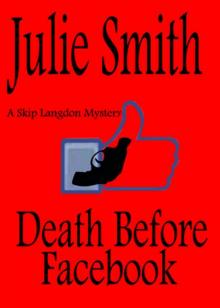 Death Before Facebook (Skip Langdon #4) (Skip Langdon Mystery) (The Skip Langdon Series)
Death Before Facebook (Skip Langdon #4) (Skip Langdon Mystery) (The Skip Langdon Series) P.I. On A Hot Tin Roof
P.I. On A Hot Tin Roof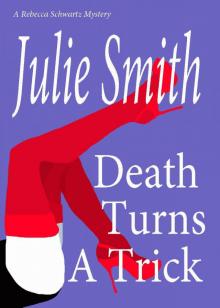 Death Turns A Trick (Rebecca Schwartz #1) (A Rebecca Schwartz Mystery) (The Rebecca Schwartz Series)
Death Turns A Trick (Rebecca Schwartz #1) (A Rebecca Schwartz Mystery) (The Rebecca Schwartz Series) The Axeman's Jazz (Skip Langdon Mystery Series #2) (The Skip Langdon Series)
The Axeman's Jazz (Skip Langdon Mystery Series #2) (The Skip Langdon Series)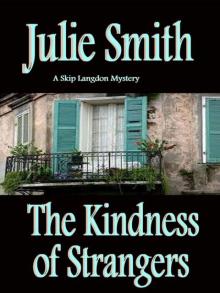 The Kindness of Strangers (Skip Langdon Mystery #6) (The Skip Langdon Series)
The Kindness of Strangers (Skip Langdon Mystery #6) (The Skip Langdon Series) Louisiana Hotshot
Louisiana Hotshot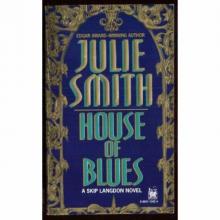 House of Blues
House of Blues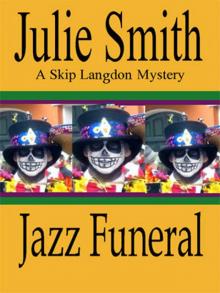 Jazz Funeral (Skip Langdon #3) (Skip Langdon Mystery) (The Skip Langdon Series)
Jazz Funeral (Skip Langdon #3) (Skip Langdon Mystery) (The Skip Langdon Series) Tourist Trap (Rebecca Schwartz #3) (A Rebecca Schwartz Mystery) (The Rebecca Schwartz Series)
Tourist Trap (Rebecca Schwartz #3) (A Rebecca Schwartz Mystery) (The Rebecca Schwartz Series)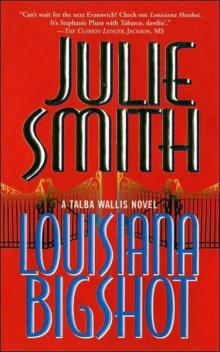 Louisiana Bigshot
Louisiana Bigshot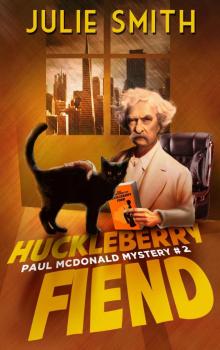 Huckleberry Fiend
Huckleberry Fiend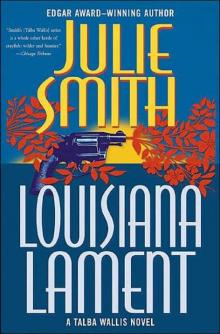 Louisiana Lament
Louisiana Lament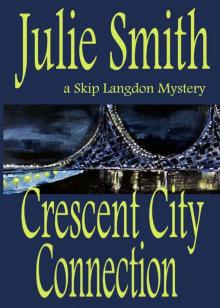 Crescent City Connection (Skip Langdon Mystery #7) (The Skip Langdon Series)
Crescent City Connection (Skip Langdon Mystery #7) (The Skip Langdon Series)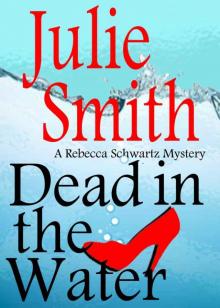 Dead In The Water (Rebecca Schwartz Mystery #4) (The Rebecca Schwartz Series)
Dead In The Water (Rebecca Schwartz Mystery #4) (The Rebecca Schwartz Series)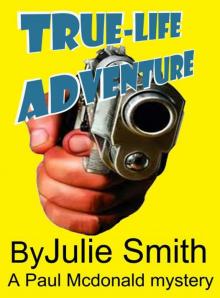 True-Life Adventure
True-Life Adventure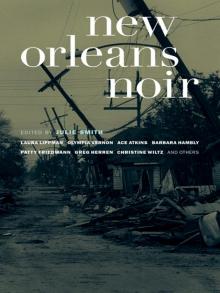 New Orleans Noir
New Orleans Noir